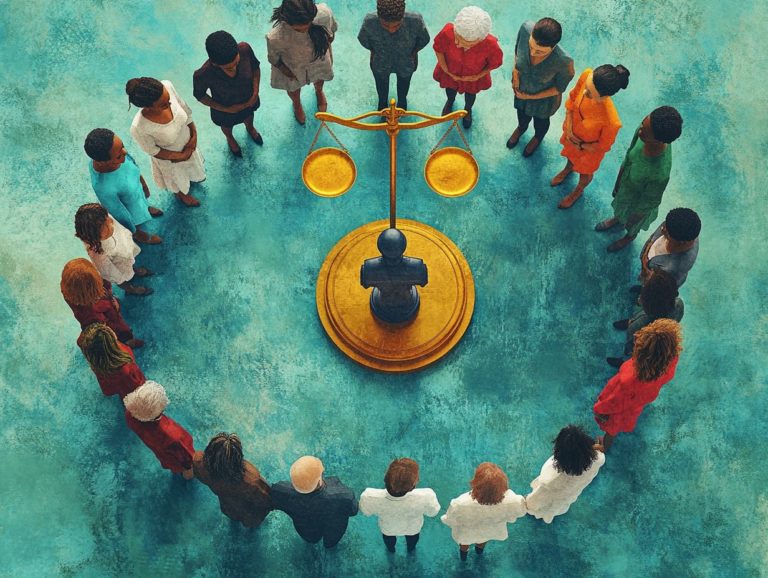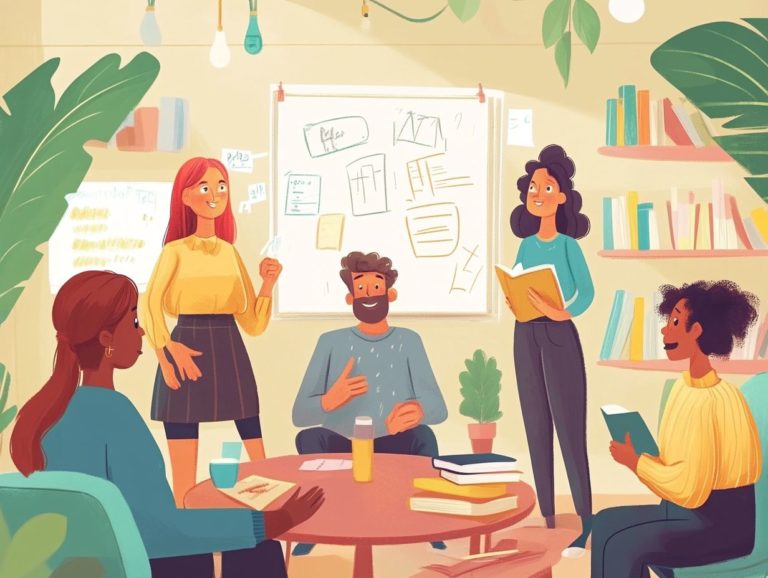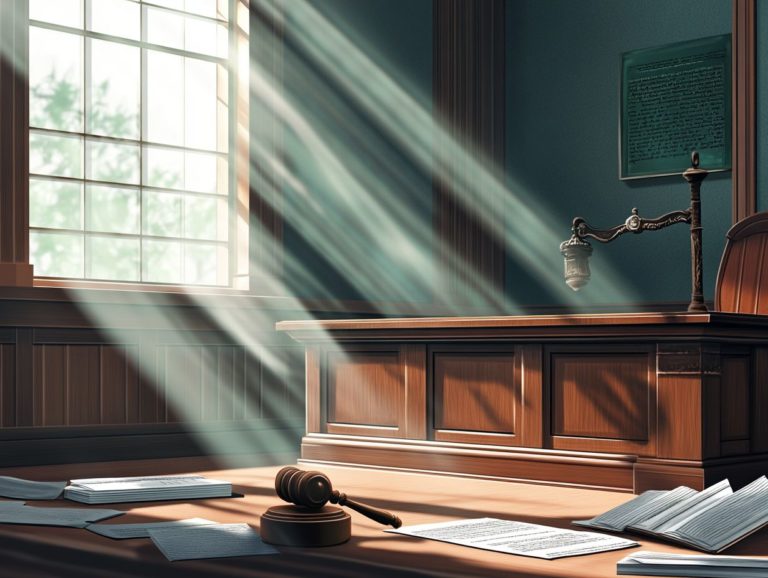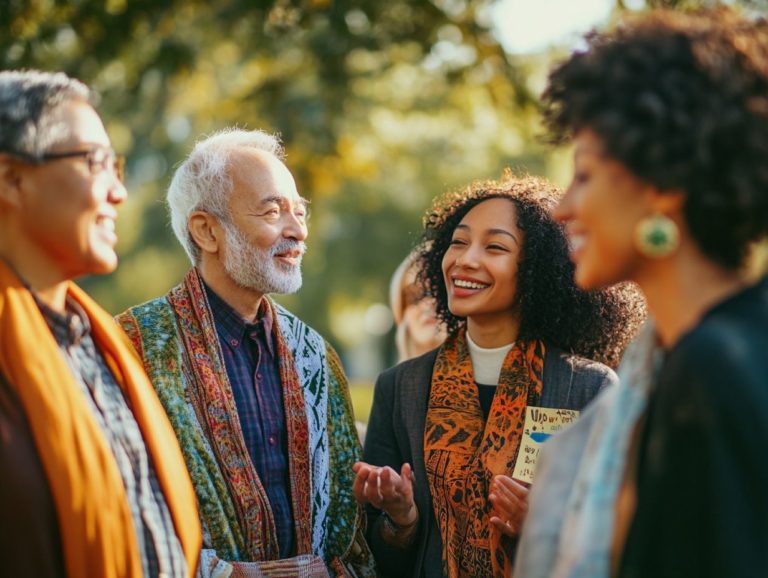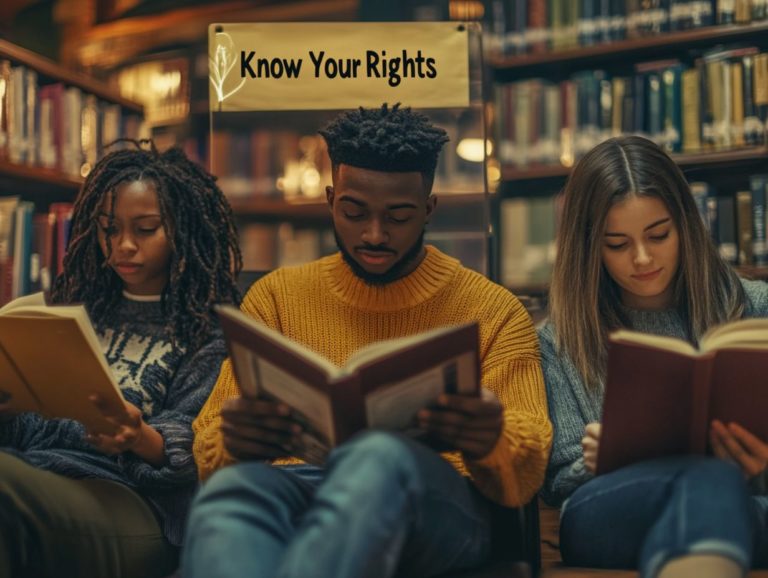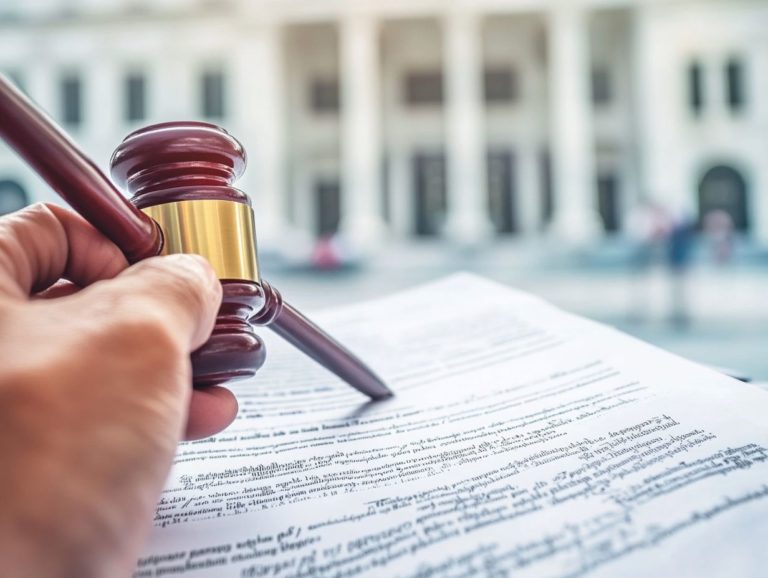10 Facts About Rights You Should Know
Understanding human rights is essential in today s intricate landscape. Rights are frequently misconstrued, with many individuals confusing them for privileges or perceiving them as absolute entitlements.
This article covers ten crucial facts about rights, shedding light on their nuances, limitations, and cultural variations. From distinguishing between rights and privileges to addressing the ongoing debates surrounding them, you ll uncover what rights truly signify and why they hold such importance in your life.
Join us now as we dive into this essential topic that affects us all!
Contents
- Key Takeaways:
- 1. Rights Are Not the Same as Privileges
- 2. Rights Can Be Limited
- 3. Some Rights Are Not Absolute
- 4. Rights Can Be Taken Away
- 5. Rights Can Be Interpreted Differently
- 6. Rights Can Be Balancing Acts
- 7. Rights Can Be Controversial
- 8. Rights Can Be Cultural
- 9. Rights Can Be Inherited
- 10. Rights Can Be Fought For
- What Are Human Rights and Why Are They Important?
- Frequently Asked Questions
Key Takeaways:
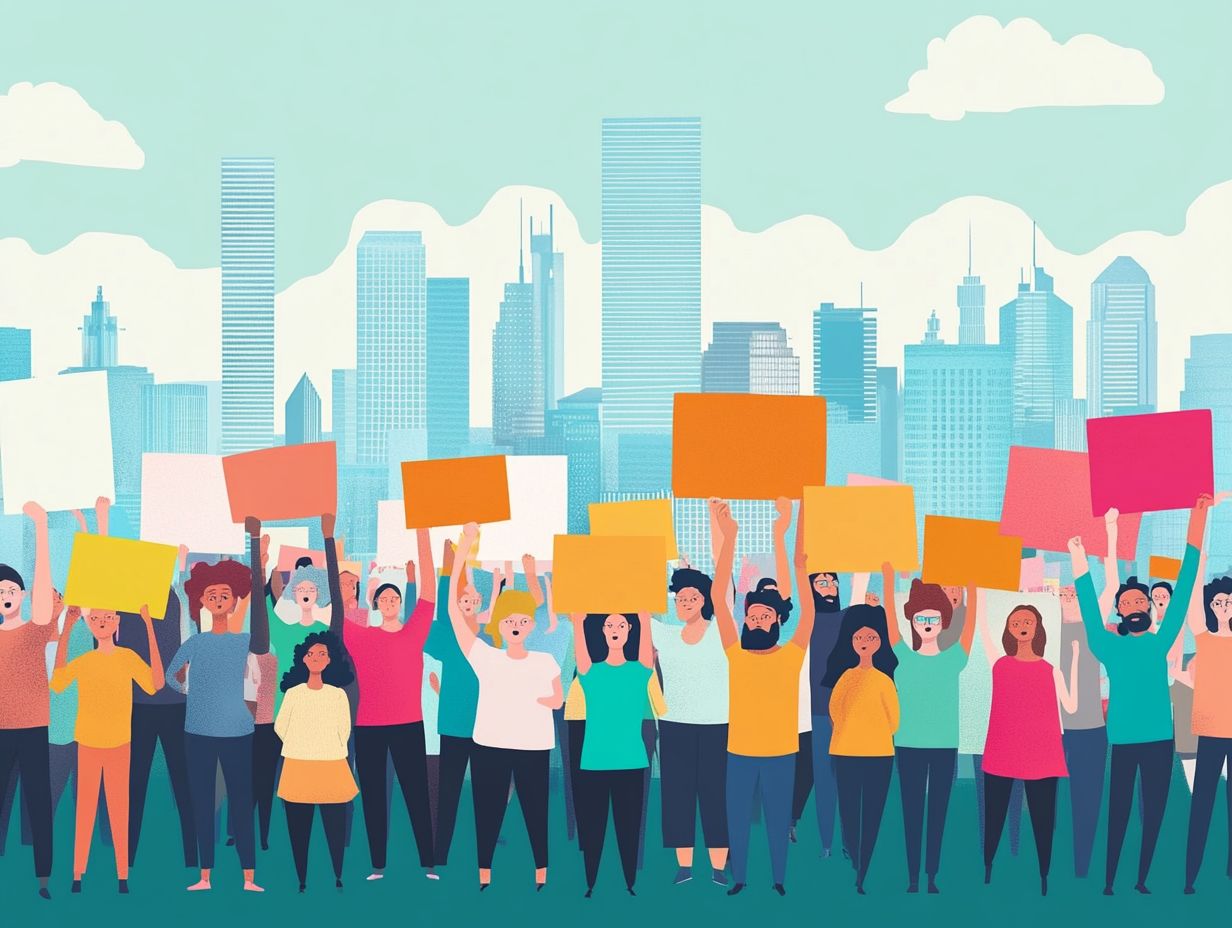
Rights are not privileges and cannot be earned or taken away.
Rights can be limited, and exceptions exist, even for fundamental rights.
Rights are interpreted differently and can be subject to balancing acts and controversies.
1. Rights Are Not the Same as Privileges
Understanding the distinction between rights and privileges is essential for you as an individual in any society. Rights are inherent to you, while privileges are granted and can be taken away.
This concept is steeped in history, echoing through foundational texts of human rights like the Magna Carta and the Universal Declaration of Human Rights. Documents like these emphasize rights such as freedom of speech and religious freedom as fundamental to your existence.
To truly grasp this distinction, consider examples from various legal frameworks, including the First Amendment in the United States, which protects individual liberties as inherent rights rather than mere privileges. Historically, rights have often emerged from struggles for justice and equality, establishing the principle that certain freedoms are non-negotiable.
Take the Magna Carta, for instance, signed in 1215 it laid the groundwork for legal rights by asserting that no one, not even the king, is above the law. Similarly, the Universal Declaration of Human Rights, adopted in 1948, serves as a global standard affirming that every individual, including you, possesses inherent dignity and rights ranging from the right to life to the freedom of expression.
On the other hand, privileges, such as access to education or healthcare, are conditional and may depend on societal norms or governmental policies. This illustrates how your status can directly influence your access to these benefits.
2. Rights Can Be Limited
While rights are undeniably fundamental, they can be limited, particularly when they clash with other rights or societal needs, such as public safety and security.
Consider times of national emergency; restrictions on freedom of speech often come into play as governments assert that unchecked expression might incite panic or threaten national security.
Landmark Supreme Court cases, like Schenck v. United States, highlight this delicate balance, illustrating how the Court upheld limitations on speech that posed a “clear and present danger” during World War I.
Similarly, in the notable case of Brandenburg v. Ohio, the Court recognized the necessity of protecting hate speech unless it incited imminent lawless action.
These rulings underscore the ongoing challenge of preserving individual liberties while simultaneously safeguarding the common good.
3. Some Rights Are Not Absolute
Not all human rights are absolute; some rights can be interpreted and limited, particularly in serious matters like violence against women or national security.
For example, international law acknowledges that while the right to freedom of expression is crucial, it can be restricted in contexts involving hate speech, incitement to violence, or defamation.
The International Criminal Court (ICC) exemplifies this nuanced approach by prioritizing accountability for human rights violations while upholding the overarching principles of justice. This flexibility aims to strike a balance between individual rights and collective security, yet it raises valid concerns about potential misuse of these limitations.
As nations navigate these intricate dynamics, the challenge is to ensure that enforceable standards are maintained without undermining the very rights they seek to protect.
4. Rights Can Be Taken Away
Rights can be tragically stripped away, often leading to severe human rights violations. History highlights serious consequences through events like the Rwandan genocide and the struggles of asylum seekers fleeing oppression.
During the apartheid era in South Africa, millions suffered under oppressive laws that robbed them of their rights based solely on their skin color. Leaders like Nelson Mandela emerged as beacons of hope, tirelessly advocating for justice, peace, and the restoration of rights.
His leadership dismantled systemic racism in South Africa and sparked global movements for human rights. This serves as a powerful reminder of the necessity for vigilance in safeguarding freedoms and confronting injustices.
5. Rights Can Be Interpreted Differently
The interpretation of rights varies significantly across cultures and legal systems. Concepts like freedom of speech and religious freedom can have diverse understandings.
In the United States, the Bill of Rights acts as a foundational framework, guaranteeing individual liberties interpreted in ways that often prioritize personal freedoms over societal norms.
This contrasts sharply with countries like China, where collective harmony takes precedence, leading to speech restrictions under the guise of social stability.
Similarly, in European nations, differing interpretations of religious freedom can result in varying laws regarding religious attire in public spaces. This shows how neighboring legal systems can dramatically differ, and understanding these distinctions is crucial!
Such discrepancies underscore the necessity of context when discussing rights on a global scale.
6. Rights Can Be Balancing Acts
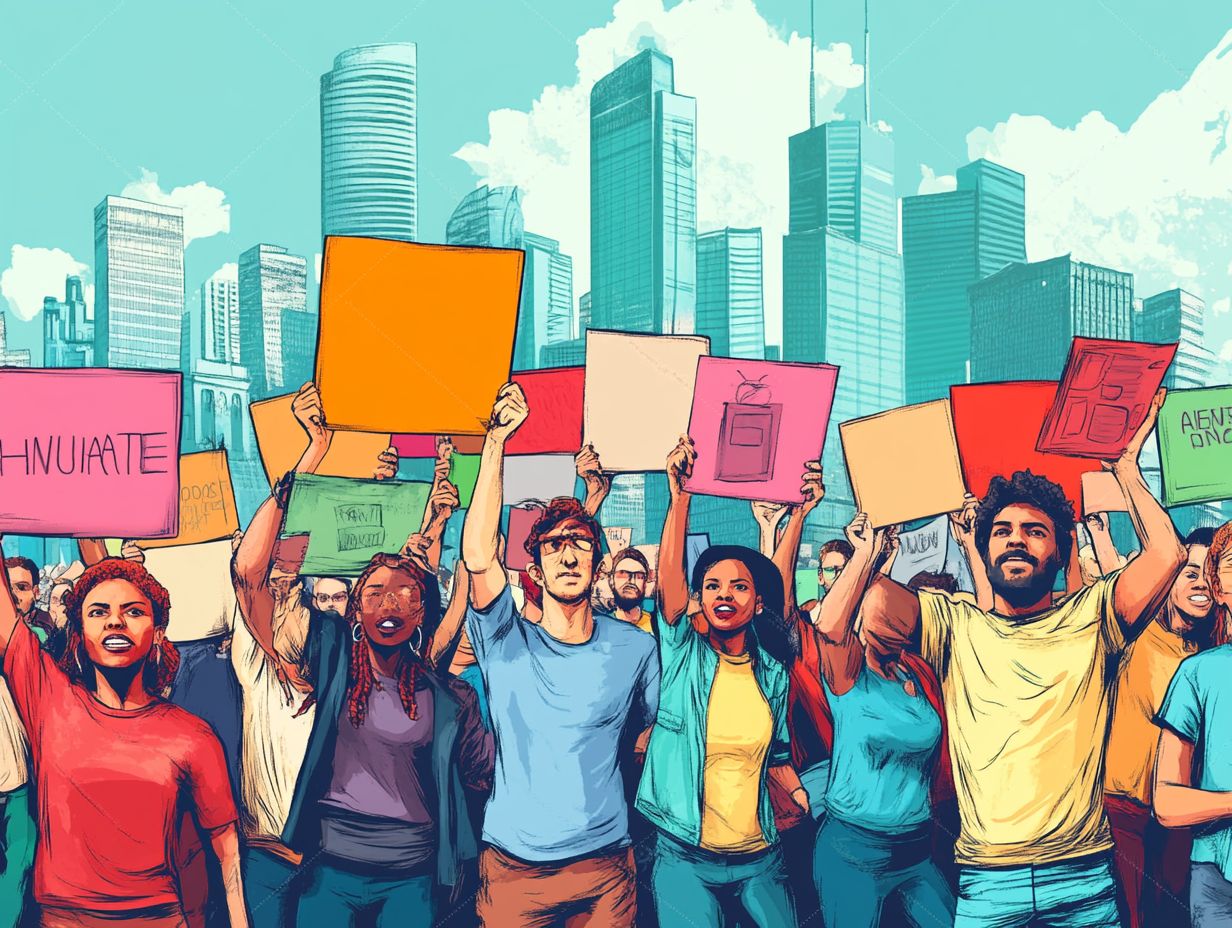
Balancing rights can be tricky. It often means weighing freedom against safety, like when addressing violence against women or food deprivation.
In this intricate landscape, policymakers and courts often find themselves at a crossroads, weighing individual liberties against the broader welfare of society.
For instance, landmark cases like ‘Gonzales v. Carhart’ illustrate how courts grapple with reproductive rights while considering ethical implications for women s health. Recent legislation concerning homeless encampments also highlights the tension between community safety and the rights of vulnerable populations.
These examples emphasize the ongoing struggle to respect personal freedoms while addressing societal needs, leading to a dynamic interplay of legal frameworks and moral considerations.
7. Rights Can Be Controversial
Many human rights issues remain contentious, particularly in the realm of LGBTQ rights, where societal norms collide with legal frameworks. Recent Supreme Court cases in the United States have ignited fervent debates about discrimination and equal protection under the law, revealing stark divisions in public opinion.
In a similar vein, ongoing discussions in countries like Hungary and Poland illustrate how governmental policies can undermine international commitments to human rights. These controversies influence public sentiment and shape future legislation as lawmakers balance traditional values with emerging social standards.
The outcomes of these legal battles have the potential to set crucial precedents that could either enhance or restrict protections for marginalized groups worldwide.
8. Rights Can Be Cultural
Cultural perspectives play a crucial role in shaping your understanding of human rights. Different societies prioritize various rights based on their unique norms and values.
This variation creates exciting discussions about how rights are understood differently around the world! For instance, in Venezuela, there is a strong focus on social and economic rights, reflecting a national ethos that often clashes with individualistic views prevalent in more Westernized nations.
In Yemen, deeply rooted traditions concerning gender roles and religion significantly influence the enforcement of rights. This creates a dynamic where cultural rights frequently overshadow universal claims.
These disparities illustrate how local beliefs and practices intersect with global human rights frameworks. It underscores the importance of fostering dialogue and understanding across cultures.
9. Rights Can Be Inherited
Many rights are inherited through legal frameworks, such as those enshrined in the Constitution and the Bill of Rights. These establish fundamental protections for you and future generations.
These legal documents do more than outline individual liberties; they lay the groundwork for social justice and equality. As society evolves, the interpretation and application of these inherited rights continue to shape the legal landscape.
Contemporary debates surrounding civil rights, privacy, and freedom of expression illustrate how these constitutional protections are both upheld and contested today. This dynamic fosters an ongoing dialogue about the essence of rights and their relevance for each new generation.
Explore how you can stand up for rights today!
10. Rights Can Be Fought For
The pursuit of human rights requires a commitment to struggle and activism, much like the journeys undertaken by figures such as Nelson Mandela and movements that championed the Civil Rights Act.
Throughout history, countless individuals and groups have risen up against oppressive systems, advocating for equality. Take the women’s suffrage movement; it mobilized a legion of activists who passionately believed in their right to vote.
In today s world, movements like Black Lives Matter shine a light on persistent disparities, evoking a collective response that resonates worldwide. These campaigns raise awareness and seek to influence legislation, driving policy changes designed to protect marginalized communities.
The courage and dedication exhibited by these activists have transformed societal norms and expectations, ensuring that human rights remain a central topic in public discourse.
What Are Human Rights and Why Are They Important?
Human rights are the fundamental freedoms and protections that you, like every individual, are entitled to. They are universally recognized through significant documents such as the Universal Declaration of Human Rights, a document that outlines the fundamental rights every person should have, and various international conventions.
These rights have evolved over centuries, shaped by philosophical thought, social movements, and pivotal historical events. This evolution underscores the crucial need to protect individuals from abuses of power.
Understanding human rights includes various categories, such as civil, political, economic, social, and cultural rights each critical to ensuring that you and everyone else can lead a life of dignity.
The universal applicability of these rights is vital; they transcend geographical, cultural, and political boundaries. They remind us of our shared responsibility to uphold the inherent worth of every person, regardless of background.
Ultimately, these principles lay the groundwork for peaceful coexistence and encourage active participation in a democratic society. Get involved and be an advocate for human rights!
What Are the Different Types of Rights?
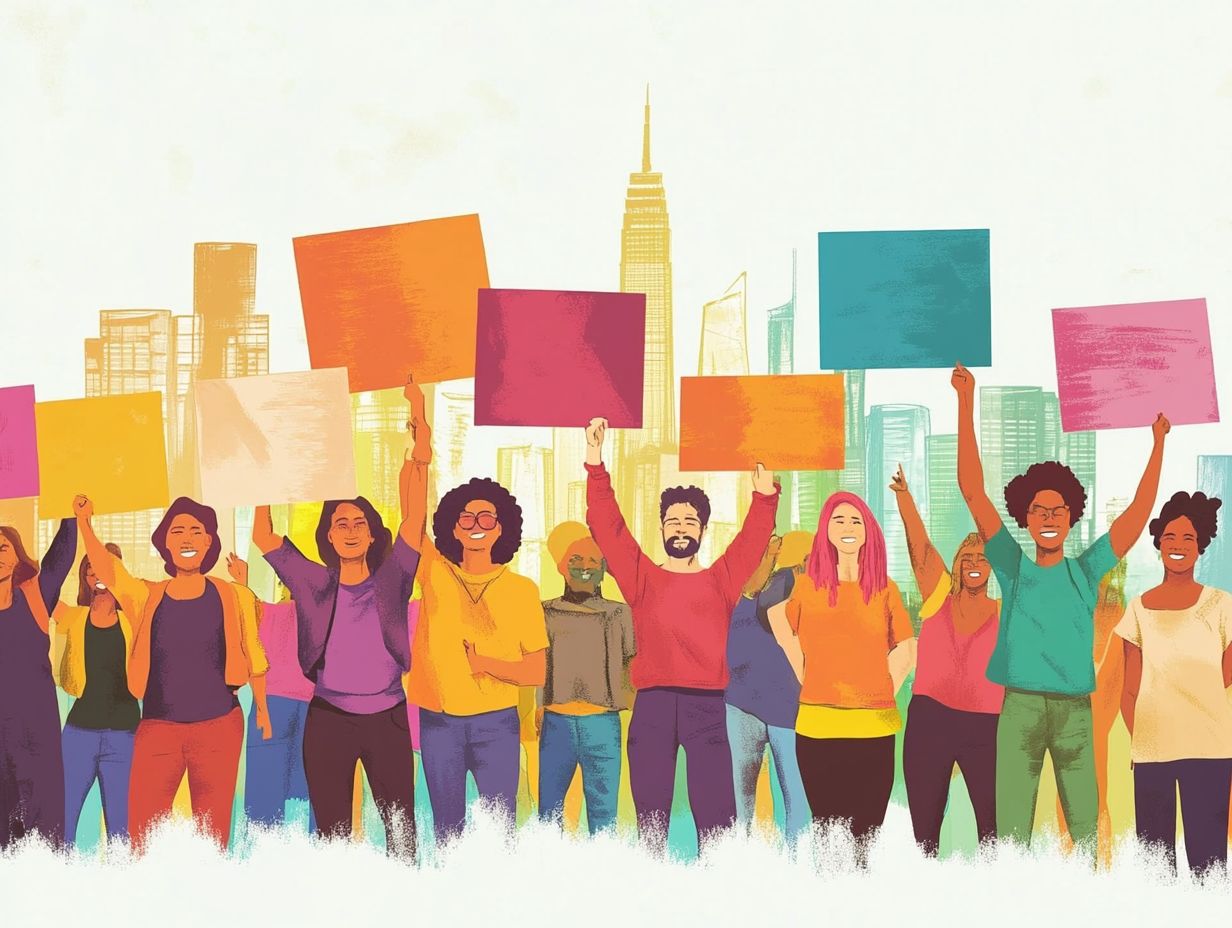
Human rights can be categorized into various types. These include civil rights, political rights, economic rights, and cultural rights.
Civil rights ensure you have the freedom to engage in activities without facing discrimination or oppression. Think of rights like freedom of speech and the right to a fair trial cornerstones of your individual liberties.
Political rights enable you as a citizen to actively participate in governance, illustrated by your right to vote and run for office.
Economic rights assure you access to resources essential for a decent standard of living, including the right to work and receive fair pay.
Cultural rights hold equal importance, recognizing the need to preserve your cultural identity. They allow communities to express their heritage freely.
Together, these categories create a connected system. A society that respects civil and political rights cultivates an environment where economic and cultural rights can thrive, enhancing your dignity and contributing to overall progress.
How Are Rights Protected and Enforced?
Rights are actively protected and enforced through powerful mechanisms, including international treaties, domestic laws, and the dedicated efforts of human rights organizations like Human Rights Watch and the International Criminal Court.
Regional bodies, such as the African Union and the European Court of Human Rights, play important roles in holding states accountable for human rights violations. They ensure compliance with established norms through structured protocols.
Grassroots community-led efforts shine a light on injustices and rally public support. Movements like #MeToo and Black Lives Matter have effectively raised awareness and driven calls for legal reforms.
These multifaceted endeavors show that while laws are essential, your active engagement as a citizen is equally vital in promoting and safeguarding human rights globally. It’s crucial to recognize that every citizen’s involvement drives change!
What Are the Limitations and Exceptions to Rights?
While rights are essential, they often come with limitations and exceptions, especially regarding national security, public order, and conflicting rights, as illustrated by various Supreme Court rulings.
These legal frameworks maintain a delicate balance between individual freedoms and societal needs.
For instance, in the case of Schenck v. United States, the Court limited speech that could endanger public safety. Similarly, in Tinker v. Des Moines, it was established that rights might be curtailed in educational settings if they disrupt the learning environment.
Exploring these rulings shows how the protection of rights sometimes needs to yield to the necessity of public safety and order, highlighting the inherent tension in the quest for justice.
How Do Rights Differ Across Countries and Cultures?
Rights can vary dramatically across countries and cultures, shaped by diverse legal systems, societal values, and historical contexts. This divergence often results in human rights violations, especially for marginalized groups.
For example, what one nation considers a fundamental human right might be interpreted quite differently in another.
In some regions of the Middle East, women’s rights are restricted by stringent interpretations of religious laws, limiting their freedom of movement and expression. Meanwhile, in Western countries, the emphasis on individual freedoms can lead to conflicts when immigrants encounter discrimination or unequal treatment.
These disparities perpetuate injustice within individual nations and stir tensions on the global stage. Countries with differing ideologies often grapple to reconcile their values and responsibilities regarding human rights issues.
How do differing interpretations of rights affect individuals in various societies? Stay informed and advocate for rights in your community!
What Are the Current Issues and Debates Surrounding Rights?
Current issues and debates surrounding human rights often draw attention to contentious topics like LGBTQ rights and violence against women.
The treatment of asylum seekers is also a crucial focus.
These discussions reflect broader societal struggles for equality and justice, revealing deep-seated inequalities that demand attention. There is an urgent need for comprehensive legal reforms and changes in the law.
Activists advocate for marginalized communities, shining a light on the deep-rooted unfairness that persists in many societies. Through grassroots movements and international campaigns, they tirelessly work for changes in the law that ensure the protection and recognition of rights for all individuals.
The evolving landscape of human rights law underscores how engagement in activism can influence policy decisions and societal attitudes. It highlights the need for ongoing conversation and active participation in the quest for universal dignity and respect.
Frequently Asked Questions
What are some basic rights that everyone should know?
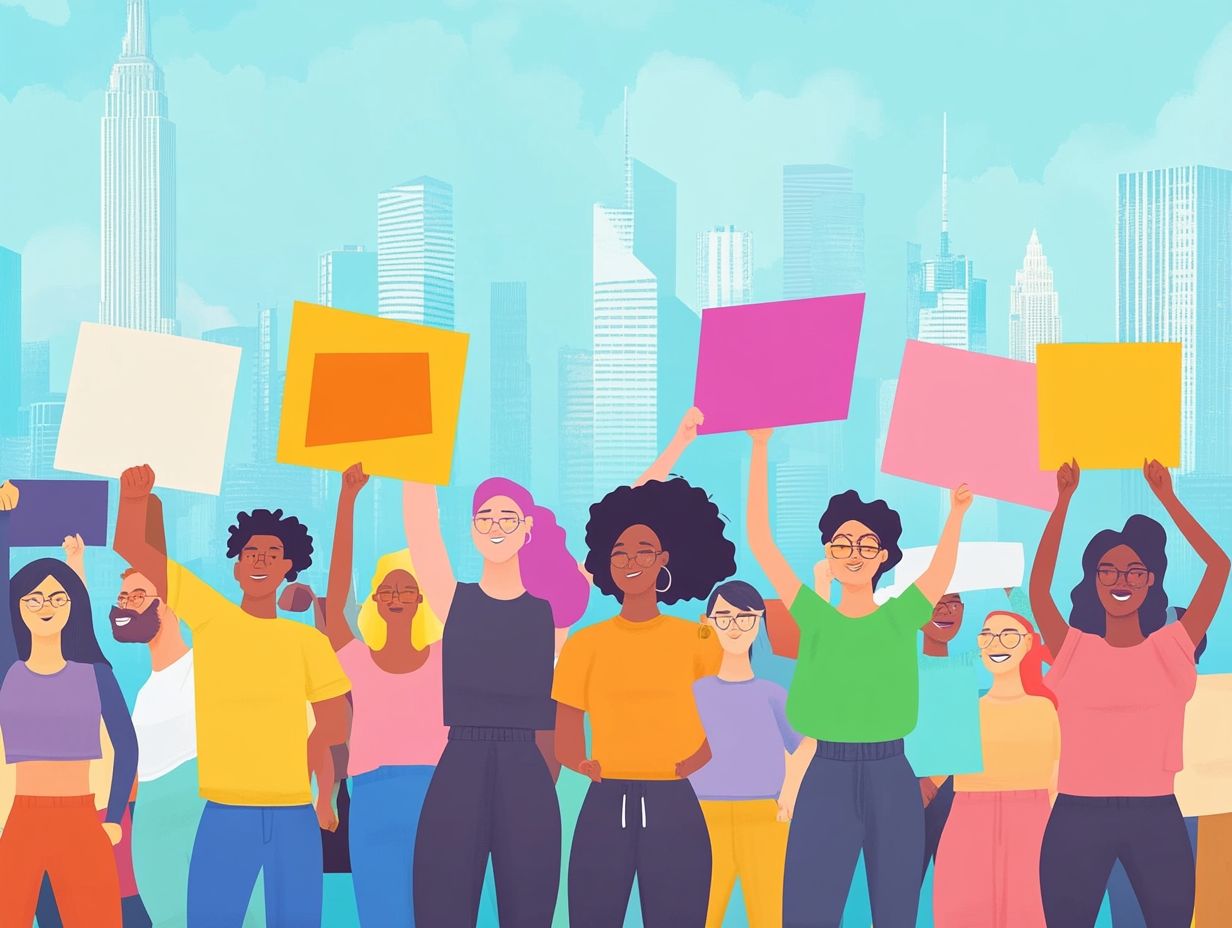
Some basic rights that everyone should know include the right to freedom of speech and expression, the right to a fair trial, and the right to privacy.
What is the significance of knowing your rights?
Knowing your rights is important because it empowers you to stand up for yourself and protect your liberties. It also helps you recognize when your rights are being violated.
Are there different types of rights?
Yes, there are different types of rights, such as civil rights, human rights, and legal rights. These rights may vary depending on the country or jurisdiction in which you live.
How many human rights are there?
There are 30 articles in the Universal Declaration of Human Rights, which is considered the international standard for human rights. However, different countries may have additional rights or laws protecting their citizens.
What should I do if I feel my rights are being violated?
If you believe your rights are being violated, you should first try to resolve the issue through peaceful communication. If this doesn’t work, you may seek legal advice or assistance from an organization that specializes in protecting rights.
Can my rights be taken away?
In most cases, no. Your rights are inalienable and cannot be taken away by anyone. However, in certain situations, such as during a state of emergency, some rights may be temporarily limited.
Learn more about your rights and get involved in local advocacy!

